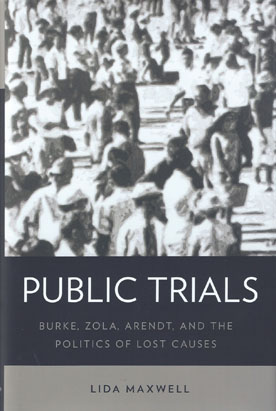
How should we view moments of democratic failure, when both the law and citizens forsake justice? Do such moments reveal a wholesale failure of democracy or a more contested failing, pointing to what could have been? There are certain moments, such as the American founding or the Civil Rights Movement, that we revisit again and again as instances of democratic triumph, and there are other moments that haunt us as instances of democratic failure.
Public Trials looks at the writings of three theorists who diagnosed moments of the latter type: Edmund Burke's writings on Warren Hastings's impeachment in late 18th century Britain, Emile Zola's writings on the Dreyfus Affair, and Hannah Arendt's writings on the Eichmann trial.
All three claimed that law and legal officials failed to do full justice to the new crimes they confronted - Hastings's imperial oppression of Indians, the French government's "crime against society," and Eichmann's "crimes against humanity." They also argued that this legal failure was enabled and supported by broad public complicity in the national myths that made injustice (or incomplete justice) appear as justice.
Maxwell looks at these three instances in order to challenge two dominant understandings of popular and legal failure in democratic theory that obscure how unsuccessful judgments can be productive. The first is that popular failure of a judgment indicates an irrational public (as legal checks and/or procedures for deliberation ensure justice); the second is that legal failure occurs when a judgment does not meet with the popular, national will.
By contrast, Maxwell sees these instances as an opportunity to question dominant norms of democratic thought. She argues that these narratives of democratic failure reveal problems with the idea that law can save the people from its failures. Burke, Zola, and Arendt recast instances of democratic failure in such a way that they become instructive in cultivating public responsiveness to such failures in the future. As Public Trials shows, such "lost cause narratives" foreground the importance of democratic action by telling stories about how the people could have pursued justice even in moments when the cause seemed foregone.